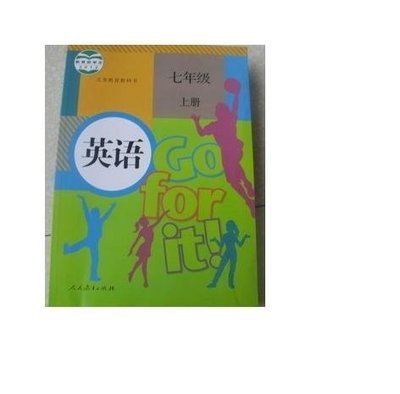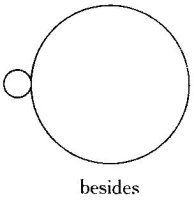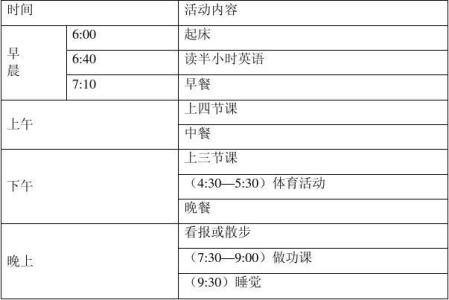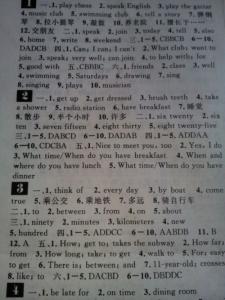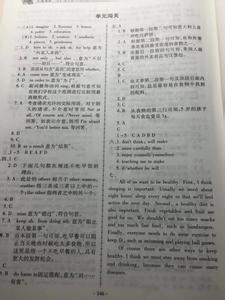Section A 重点难点解析
1 -Where did you go on vacation?你到什么地方去度假了?
-I went to Summer Camp.我参加了夏令营。
1)此句中vacation是美国英语的习惯用法,与英国英语holiday意思相同,作“假期,休假”讲,例如:
You have two weeks' vacation/holiday in this job.你干这个工作一年有两个星期的假期。
2)vacation作为vi.,vacation in/at在……度假,例如:The Greens are vacationing in Beijing.格林一家在北京度假。此句为一般过去时的特殊疑问句和肯定句。
went是go的过去式,疑问句应在主语前加助动词did,而动词需用原形,否定句是在主语后加助动词did,再加动原词形。例如:They went to the park yesterday.昨天他们去公园了。
2 I stayed at home.我呆在家里。
1)此句中home是副词,home作副词时意思是“在家;到家;回家”例如:
I went home at six yesterday.我昨天6∶00回家。
2)home还可以作名词,意思是“家;家乡”等。例如:
Shandong is my home. 山东是我的家乡。
3 Did you go to the movies?你们去看电影了吗?
此句movies是美国英语的习惯用法,相当于英国英语中的film,意思是“电影;影片”。而go to the movies是个习惯说法,也可以说go to the cinema。例如:
Let's go to the movies/cinema tonight.今晚我们去看电影吧。
4 Julie studies for exams last night.
昨夜朱丽为了考试而努力学习。
for介词“为了”,表示目的。例如:
Father went to Qingdao for vacation last week.
上周父亲去青岛度假了。
5 It was pretty good.相当不错。
pretty在此句中为副词,意思是“相当;颇为”。例如:It is pretty cold today.今天天气相当寒冷。
6 How was the weather?天气怎样?
It was rainy.多雨。
此句How was the weather?=What was the weather like?这个句型是用来询问天气情况的,回答用表示天气变化的形容词,像hot,cold,widy,rainy,cloudy,snowy等,例如:
What's the weather like yesterday? It was cold.
昨天天气怎么样?冷。
7 What did these people think of their vacation?
这些人觉得他们的假期怎样?
相当于How did these people like their vacation?例如:
What do you think of the story?=How do you like the story?
你觉得这故事怎样?
归纳:think of想起,认为;think about想,考虑;think over仔细思考He is thinking about where to go.他在考虑去哪儿?
I think of my father.我想起了我的父亲。
Please think the problem over.请仔细想想这个问题。
8 Show the album to your classmates and talk about your vacations.把这个影集给你的同学看并谈论你的假期。
show sth. to sb.把某物给某人看。相当于show sb. sth.。例如:
Show me your new pen.=Show your new pen to me.
把你的新钢笔给我看。
Section B 重点难点解析
1 Listen to Vera talking about her vacation.
听维拉谈论他的假期。
listen to sb. doing sth.听某人在干某事。例如:
I'm listening to Jim singing Chinese songs.我在听吉姆唱中文歌。类似于listen to,其后带现在分词的动词有hear,see,watch,notice,look at,feel等,这些动词后还可跟省to不定式,其区别在于跟doing指宾语的行为、动作正在发生;跟do指宾语经常、习惯性的动作。例如:
I saw them playing football.我看见他们在踢球。
I often see them play football after class.
我经常看见他们课后踢球。
2 We had great fun playing in the waves.
我们在海浪里玩得很快乐。
此句中have fun=enjoy ourselves,意为:过得愉快。而词组have (great) fun doing sth.,表示:干某事干得很高兴(开心)例如:She had fun talking with her friends.她和朋友们谈得很开心。
3 In the afternoon, we went shopping.下午,我们去购物了。
go shopping去购物,类似短语还有:go fishing去钓鱼
go boating去划船;go swimming去游泳等。例如:
Yesterday morning we went fishing.昨天上午我们去钓鱼了。
4 I found a little boy crying in the corner.
我看见一个小男孩在角落里哭。
little此处为adj.“小的”,带有一定的感情色彩。例如:
What a pretty little house!多漂亮的小房子啊!
That poor little girl.那个可怜的小女孩。
5 He was lost and I helped him find his father.
他迷路了,我帮他找到了他父亲。
此句中help sb. do sth.意为:帮助某人干某事,同义语为help sb. with sth.。例如:
I helped my mother clean the floor yesterday.昨天我帮妈妈擦地板。She helped him with his English last week.她上个星期帮他学习英语。
6 That made me feel very happy.那让我感到高兴。
此句中make为使役动词,后接不定式时,to常省略。make sb. do sth.,意为“使某人做某事”。例如:
Tom made me clean my room last week.汤姆上星期让我打扫房间。
7 Today the weather was cool, so we decided to play tennis.
今天天太凉,所以我们决定打网球。
此句中decided to do sth.意为:决心干某事,例如:
They decided to play football with Class One.
他们决定同一班踢足球。
词语辨析
1.learn与study
(1)这两个动词都作“学习”解,有时可以互换使用。如:
He is learning/studying English now. 现在他在学习英语。
(2)learn往往指通过学习、练习或由别人教授以获得某种知识或技能,侧重学习的成果,有“学会”、“学到”的意思。study通常指比较深入地学习,含有努力去学的意味,它侧重学习的过程,有“研究”、“钻研”的意思。如:
He studied hand and finally learned the language. 他努力学习,终于学会了这种语言。
注意:“向某人学习”应该说learn from sb.,不能用study。如:
Learn from Lei Feng. 向雷锋学习。
2.and与or
and与or都是并列连词,但用法不一样。在肯定陈述句中,并列成分之间一般用and连接,在否定陈述句中,并列成分之间一般用or连接。如:
I have pens and pencils. 我有钢笔和铅笔。
I have no pens or pencils. 我没有钢笔也没有铅笔。
注意:可以说:I have no pens and no pencils. 因为and no pencils是and I have no pencils的省略说法,即no A or B = no A and no B。
3.all与all of
一般说来,all和all of都可以放在有限定词(如冠词、物主代词等)修饰的名词之前。如:
All (of) my friends are working hard. 我的朋友都在努力工作。
All (of) the food is good to eat. 所有的食品都好吃。
但是,如果名词前面没有限定词修饰,则不能用all of。试译:
所有的孩子都喜欢看电视。
误:All of children like watching TV.
正:All children like watching TV.
All of后面还可以跟人称代词宾格(us, you, them),而all则不能。如:
All of us are very busy. 我们大家都很忙。
试译:他们都是工人。
误:All them are workers.
正:All of them are workers.
4.动词have除作“有”讲外,还可以有以下语义:
(1)“买”。如:
I want to have a kilo of meat. 我要买一公斤肉。
(2)“用,使用”。如:
Excuse me, may I have your pen, please? 打扰了,我可以用用你的钢笔吗?
(3)“做某事”。如:
have a drink (of) 喝一点
have a look (at) 看一眼
have a rest 休息一下
have a swim 游泳</PGN0174.TXT/PGN>
(4)“用餐”。如:have breakfast/lunch/supper吃早/中/晚饭
(5)“吃,喝”。如:have(some)cake吃饼have(a cup of)tea喝(一杯)茶
(6)“经历,度过”。如:have a good time度过快乐的时光
单词解析
1.camp/k?mp/
n. 营地v. 宿营,扎营:Where shall we camp tonight? 我们今夜将宿营何地?
【引申】camp bed行军床;Camp David戴维营(位于美国马里兰州山间的总统别墅);campfire/?k?mpfai?/营火;campus/?k?mp?s/校园。
2.museum/mju:?zi?m/
n. 博物馆:the Palace Museum故宫博物馆;the science museum 科学博物馆
3.exam/?g'z?m/(examination/iɡ?z?mi?nei??n/的缩写)
n. 考试,测试,检查:What does he say about Jim's Chinese exam? 关于吉姆的语文考试他怎么说的?
4.expensive/iks?pensiv/
adj. 费用大的,昂贵的
【记忆法】expens(e)+ive, 名词expense和-ive后缀构成其形容词形式。
【引申】同义词:costly, dear; 反义词:cheap, inexpensive。
5.crowded/?kra?d?d/
adj. 人(太)多的,拥挤的
6.lost/l?:st, l?st/(lose/lu:z/的过去式)
v. 迷路,迷失:He lost his way. 他迷路了。
7.tired/?tai?d/adj. 劳累的
【考点】be tired of对……厌烦:I'm tired of eggs. 我吃腻了鸡蛋。
语法知识
语法
巧记动词过去式
1.be用was或用were,have,has变had.一般动词加-ed,若是特殊得硬记。
事情发生在过去,经常、反复或连续。时间可长也可短,动词时态用“过去”。
2.动词一般过去时,表示过去发生事。谓语动词过去式,过去时间作标志。
否定句很简单,主语之后didn't添,疑问句也不难,did放在主语前。如果谓语之前有did,谓语动词需还原。动词若是was,were,否定就把not添。
巧学动词be的一般过去式
掌握动词be的一般过去时口诀。be的过去时有四巧:
一是时间状语巧,表示过去的短语要记牢;
二是形式巧,单数was,复数were;
否定句结构是三巧,not紧跟was/were;
四是疑问句式巧,was/were向前跑(提前)。
知识点聚焦
一、词汇
掌握:New York City, Central Park. exam, were, rainy, delicious. expensive, crowded, inexpensive, felt, little, corner, till, fry, questionnaire, discuss, sex
理解:boring, relaxing, soccer, movies, unfriendly, fantastic. pretty
二、语言目标
Section A
1.-Where did you go on vacation?
-I stayed at home.
2.-Where did Tina go on vacation?
-She went to the mountains.
3.-Where did she/he/they go on vacation?
-She/He/They went to New York City.
4.-Did you/he/she/they go to Central Park?
-Yes. I/he/she/they did.
-No, I/he/she/they didn't.
Section B
1.-Where did Vera go on vacation?
-She visited the museums.
2.-Did Vera like her vacation?
-Yes. she did.
3.-How was/were…?
-It was/They were…
三、语言结构
1.行为动词的一般过去时。
2.be动词的一般过去时。
3.how, where引导的特殊疑问句。
四、学法向导
1.掌握一般过去时的构成。
2.掌握一般过去时的一般疑问句及答语。
3.学会制作调查表。
重点难点
一般过去式
前面我们学习了be动词的过去式,本单元我们将学习部分规则、不规则的行为动词的过去式。
(1)一般过去时表示过去某个时刻或某一段时间内发生的动作或存在的状态。通常与表示过去的时间状语连用。动词用一般过去式来表示。除动词be的过去式was/were有人称和数的变化以外,其他所有动词的过去式没有人称和数的变化。
(2)行为动词过去式的变化规则及读音
词尾-ed的读音
(3)不规则动词过去式有其特殊形式。
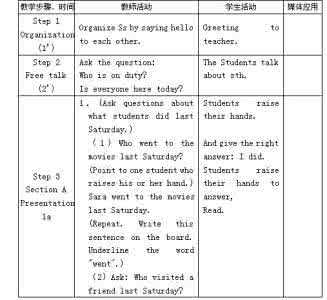
have/has-had do/does-did go-went come-came get-got
forget-forgot buy-bought read-read know-knew
find-found meet-met fly-flew
 爱华网
爱华网